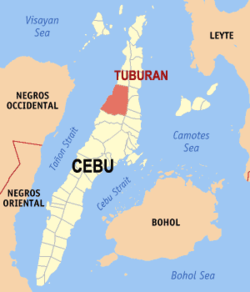Tuburan, Cebu
| Tuburan | |
|---|---|
| Municipality | |
 Map of Cebu with Tuburan highlighted |
|
| Location within the Philippines | |
| Coordinates: 10°44′N 123°50′E / 10.73°N 123.83°ECoordinates: 10°44′N 123°50′E / 10.73°N 123.83°E | |
| Country | Philippines |
| Region | Central Visayas (Region VII) |
| Province | Cebu |
| District | 3rd district of Cebu |
| Founded | 1851 |
| Barangay | 54 (see § Barangays) |
| Government | |
| • Type | Sangguniang Bayan |
| • Mayor | Democrito Diamante (LP) |
| • Vice mayor | Danilo Diamante |
| • Town Council |
Members
|
| • Representative | Gwendolyn Garcia |
| Area | |
| • Total | 224.50 km2 (86.68 sq mi) |
| Population (2015 census) | |
| • Total | 63,866 |
| • Density | 280/km2 (740/sq mi) |
| • Voter (2016) | 42,547 |
| Time zone | PST (UTC+8) |
| ZIP code | 6043 |
| IDD : area code | +63 (0)32 |
| Income class | 2nd class |
| PSGC | 072252000 |
| Website | www |
Tuburan is a 2nd municipal income class municipality in the province of Cebu, Philippines. According to the 2015 census, it has a population of 63,866. In the 2016 electoral roll, it had 42,547 registered voters.
Tuburan was the hometown of the revolutionary leader Arcadio Maxilom.
Tuburan is known for its crystal-clear springs, beaches, creeks, rivers, caves and natural splendours that draw adventure-seekers and nature-lovers.
Industrial and domestic products include decorative apparel and fashion accessories made of seashells and coconut shells, wood and other indigenous products. Tubod Festival is held in honor of the parish patron, Saint Anthony of Padua.
Tuburan was founded in the 1851 by Don Mariano Montebon who came from the town of Sogod. The townsite was first located at Daan Lungsod which is just across the Adela River, north of the present poblacion. Tuburan got its name from the prevalence of springs, which are the sources of potable water for household use of the early settlers. "Tuburan" evolved from the Cebuano word Tubod, meaning "spring".
General Arcadio Maxilom y Molero was a hero of the Philippine Revolution. He was born in Tuburan where his family were members of the local gentry, or principalía. He worked joined the Katipunan, whose activities in Cebu were led by León Kilat.
After Kilat's execution, Maxilom continued the revolution in Cebu as command. The Katipunan were regroup in the impenetrable central highlands. On 16 December 1898, Maxilom wrote a letter to the Spanish authorities in Cebu, demanding that the latter surrender. Weary after incessant fighting, the Spaniards quickly responded, and in Christmas Eve the Spaniards had left, leaving behind only three Catholic clerics.
...
Wikipedia

